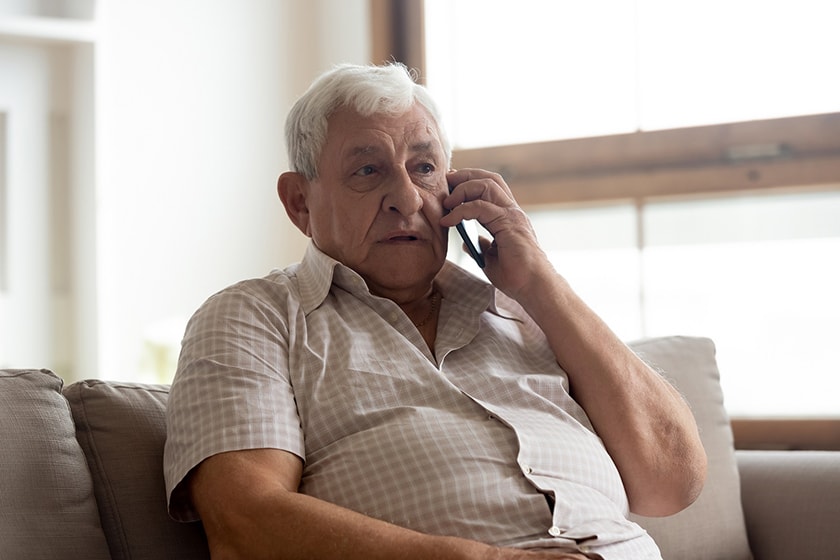Meeting unprecedented need in unprecedented times
14 Apr 2020

COVID-19 means the need for services supporting the community has never been greater and is likely to continue increasing exponentially in coming months.
All Social Outreach services are provided at no cost and have evolved to meet the challenges of COVID-19. Keep reading to find out how.
Mental health
Agility has been the name of the game, with our perinatal mental health service, Raphael Services moving to telehealth (video or phone), rather than face-to-face, counselling sessions in record time.
Raphael Services National Director, Helen McAllister, said a limited amount of telehealth was already being provided in Victoria but a significant focus on testing and increasing capacity has enabled it to now be offered more broadly to meet the significant increase in demand that’s been generated by COVID-19.
“Understandably, many of our clients have told us they are reluctant to come in for a face-to-face appointment at the moment and we’ve been able to respond by brining counselling directly to people in their homes,” she said.
“This also makes it more convenient for people with child caring duties and makes it possible to service a greater geographic spread in Victoria, NSW and WA.”
Raphael Services are provided free of charge and can be accessed with a GP referral and Mental Health Treatment Plan (Mental Health Treatment Plan is not required in NSW).
St John of God community mental health services in regional Victoria and Perth’s south have also moved to telephone consultations, ensuring clients can continue to access support without having to leave their homes.
Community mental health services National Director, Anna-Marie Thompson is expecting to see a steady increase in referrals as people grapple with the impact of changed home arrangements, financial stress and increased feelings of vulnerability and uncertainty.
“The impact that this pandemic is having on the mental health of our community is significant and we are proud to be here to support those who need our help during these unprecedented times,” Anna said.
“We have focused on how we can provide telephone services that enable clients to feel engaged and connected in a virtual context.”
Community mental health services are provided at low or no cost and can be accessed with a GP referral and Mental Health Treatment Plan.
Accommodation
Supported accommodation services, Casa Venegas and Horizon House, have quickly adapted to the new behavioural requirements issued by the federal and state governments to ensure the safety and wellbeing of our clients and caregivers.
Casa Venegas Director, Bronwyn Howlett said it’s about continuing to provide a sense of security and routine for clients.
“We’re also letting clients know, as much as we can, what to expect," Bronwyn said.
“It’s reassuring for them to be stepped through the slight differences that they will see in the way we support them, like ensuring social distancing and extra cleaning at houses.
“We’ve also made sure to let them know how we’ll help them if they do become unwell.”
At Horizon House, Support Coordinators are engaging creatively with young people to ensure they can continue to participate in study and maintain social connections whilst observing the need for social distancing.
Both services have seen a significant increase in referrals and are working hard to accommodate as many people as possible during this time of unprecedented demand.
Both accommodation services accept referrals from a range of sources, including self-referrals.
Alcohol and other drugs
The South West Community Alcohol and Drugs Service (SWCADS) provides numerous programs throughout WA’s South-West, all of which have had to adapt to new ways of working.
Manager Trudi Ruane said in times like this it was vital to keep up services that support people with counselling for alcohol and other drug issues, as these could escalate when people are under pressure and feeling increasingly vulnerable.
“We continue to support the region as we always have in the area of alcohol and other drugs, albeit in slightly different ways to ensure client and caregiver safety,” Trudi said.
“Many people may not be aware that SWCADS also provides the region’s suicide prevention co-ordination, so we are working hard to ensure all mental health and AOD services in the region stay connected, and that they are prepared for an extremely busy 2020."
The Drug and Alcohol Withdrawal Network (DAWN), which provides triage, case management, referral, assessment and ambulatory/home-based withdrawal for people wanting to address their substance use, continues to work throughout the Perth community.
This has a new level of complexity with the advent of home isolation and recommendations on social distancing, however our caregivers are negotiating the situation with a true focus on meeting the needs of our clients in the safest way possible.
Social Outreach CEO, Sue Cantwell said all services are well positioned to meet the growing demand for the support they provide.
“We’re here, we will continue to be here, and we are ready to support those who need us,” Sue said.
You may also be interested in
